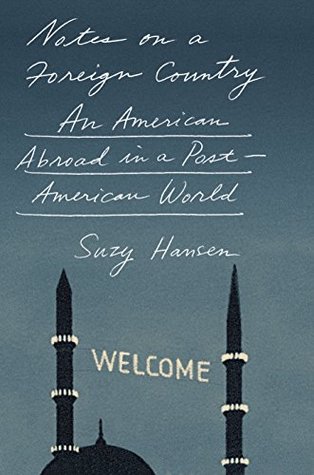More on this book
Community
Kindle Notes & Highlights
by
Suzy Hansen
Read between
May 4 - June 12, 2018
Having lived in Turkey for over a year, witnessing how their own nationalistic propaganda had inspired their views of the world and of themselves, their newspapers and their school curriculums, I wondered from where the belief in our objectivity and rigor in journalism came. Why would Americans be objective and everyone else subjective? From where did we get this special power?
I realized that American pundits often described the Middle East as some foreign, chaotic, unraveling, atavistic, violent, inhuman place but were oblivious to their own extraordinarily barbaric history: the Indian wars, the tree-strung lynchings, the My Lai massacre.
Rejecting the word “empire” had long been a way for Americans to avoid taking responsibility for acting like one, which was a habit embedded into the American character from the moment of its birth.
What did he mean, my country had everything to do with what Iraq was like then? There I had the usual problems. One, I did not know the history. Two, I did not know to imagine how that history affected people on an individual level. Our foreign policy, our wars, almost never affected Americans. What did he mean? He meant the bombs of 1991, which nearly destroyed Baghdad and killed thousands of people, and he meant the support for Saddam in the 1980s, which prolonged the Iran-Iraq War. And he meant the sanctions, which destroyed the livelihoods of men and families, plunged people into poverty,
...more
The difference between us and them is that our country has created this universe in which sanctions are acceptable punishment for everyone except our country. It means that no other country can force my father to lose his job, or force my family to go hungry, or to break up my family, or to forever distort my future, but my country can do that to almost any other foreigner, including the man sitting across from you at a café.
“I have to get back to the office for a teleconference with my president,” he said. “He will not be happy if I am late.” I wondered why Americans always spoke to grown men in foreign countries as if they were children; why in fact the Americans behaved like children.
The future of Pakistan was changed forever by this American intervention, not only the political landscape and the possibilities of violence, but the way individuals related to God. As she notes: What was once devotion became fundamentalism. When American pundits and politicians lashed out after September 11 about the dangers of Islam, Shamsie thought such emotions terrifying in their reckless hypocrisy. During the Soviet-Afghan war, the United States and Pakistan together, in a supremely cynical alliance, had created a generation of Islamic fundamentalists—designing jihadi textbooks and
...more


